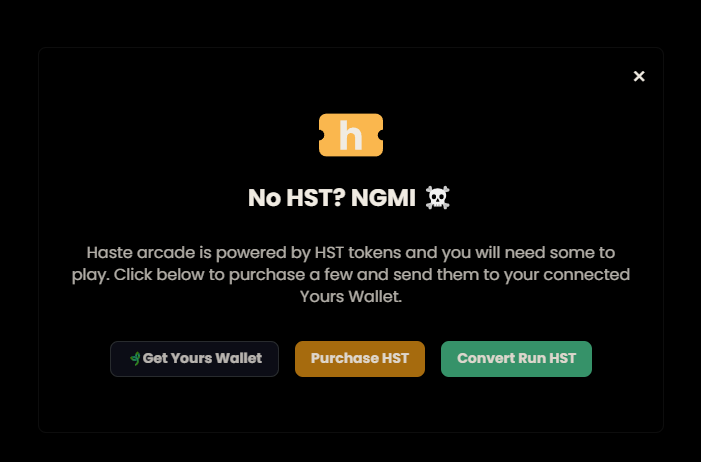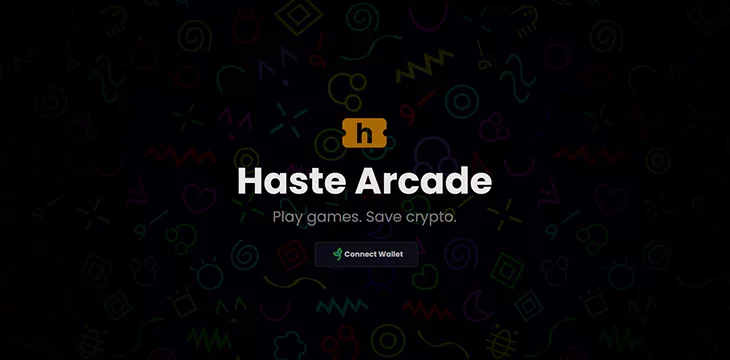|
Getting your Trinity Audio player ready...
|
Blockchain gaming platform Haste Arcade has announced some changes as it seeks to onboard new users. In response to feedback about desired features and barriers to entry for developers, the team is simplifying its security model, releasing an SDK for game builders, and replacing its original Instant Leaderboard Payouts (ILP) concept with a coin-locking mechanism.
It’s no secret that some developers of P2E (play-to-earn) and other games have struggled to find an adequately large user base with BSV blockchain-based apps. Though BSV’s key features of fast/cheap transactions and an unbounded scaling capacity are an ideal match for provably fair gameplay and tokenized game items, they’ve found these are not always features players demand most.
As with social networks and user-created digital media, customers will gravitate toward platforms with larger audiences regardless of whether their technological backbones are superior or not. This reality has seen some developers move (allbeit reluctantly) to other blockchains in part or in full.
Chapter 3 begins now.
🔒 $HSThttps://t.co/qs80qHJlYE— Haste Arcade | Game Platform (@hastearcade) June 4, 2024
However, that’s not the case with Haste Arcade. The team said in a Medium post last week that it was determined to continue building on BSV.
“While Haste Arcade hasn’t met our expectations yet, we’re driven by our passion for Bitcoin and the belief in its potential. Despite the setbacks, we remain committed to our vision and have decided to continuing pushing forward.”
Haste acknowledged there had been a downturn in usage, partly due to P2E gaming losing some appeal in general, and also because its anti-cheating security mechanisms had perhaps been too strict. This in turn created a steeper learning curve for game developers, who found them complex and lacked resources to implement them.
“After a series of difficult decisions starting towards in the Fall of 2023, we’ve positioned the company to sustain for the long-term with a continued belief that a scalable version of Bitcoin, that supports micropayments, will ultimately prevail. We understand it is not the socially accepted, or dare we say ‘socially engineered’, norm, but it is our conviction and something we believe is worth fighting for.”
So what’s new, and what’s changing at Haste?
The company has decided to implement a few changes, while sticking to its ethos of “Simplicity and Fun,” saying “today we return to our roots.”
The main new concept is something called “Stake to Play,” or “Save to Play.” The main difference between P2E (and ILP) is that players will now “lock” an amount of their HST tokens (now the platform’s native currency) for a certain time while they’re playing and receive them back into their wallets at the conclusion.

Players earn XP (experience points) based on their activities in the games and their chosen stake settings. Developers can still make money from their games, but in more familiar ways: in-app purchases and paid games.
“The original platform was built exclusively for ILP (which we started calling HLP),” the Haste team told CoinGeek. “This limited game developers to creating competitive, real-money games. While that’s great, it came with many challenges. The new model is completely open and supports any type of game, whether free, paid, ILP, or otherwise.”
Build with the Haste SDK, play and earn with the HST token
There’s a new Haste Arcade SDK to make things simpler for game developers, meaning new features can be added with method calls. Score submission and game security now work on a “secure enough” approach that uses only wallet signatures and unique transaction IDs (TXIDs), all on the client side.
Haste Arcade is currently offering a 50,000 HST bounty for the first game developer to integrate a game using the new SDK, and the team plans to offer additional rewards to early developers.
HST itself is now a 1Sat Ordinals token using the BSV21 protocol for fungible tokens. Haste noted that this is the first implementation of a Bitcoin fungible token using asset locks, using a lockup contract developed by David Case. Rather than being a reward token players “earned” by playing games, HST is now the main in-game currency for the Haste Arcade platform and can be used by both players and developers. HST assets can be cashed out using 1Sat.Market.
“We’ve tested and looked into many different token protocols over the years,” they added. “BSV21 on the 1SatOrdinal protocol has proven to be reliable and has more adoption than any other token protocol on BSV. It was an easy choice.”
Haste Arcade is not completely shutting out other blockchains. There is now a wrapped version of the HST token on the Solana network (known as WHST).
“It’s worth mentioning that over 15 million HST coins have been locked within the first few days of relaunching the platform. Users choose the amount and duration of their lock and earn ‘XP’ in return. We are also looking into staking rewards for all users.”
Currently, there’s only a limited number of games available on the Haste Arcade catalog. “To move forward, we’ve taken a few steps back,” the team said. However, the simplified rules for developers and new SDK makes it much easier to build and add new games, and Haste is always looking to get in touch with anyone who’s interested.
“We encourage game developers that are interested in adding their game/s to reach out to us on X (@hastearcade) or join our discussions on Telegram.”
Watch: Unlocking new game economy powered by BSV

 02-20-2026
02-20-2026 




